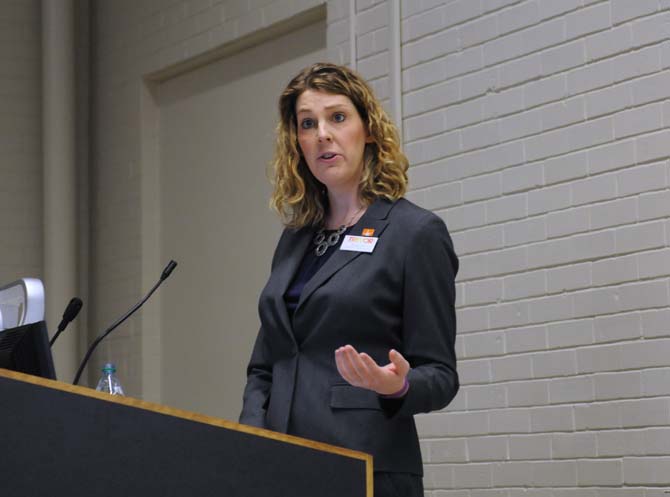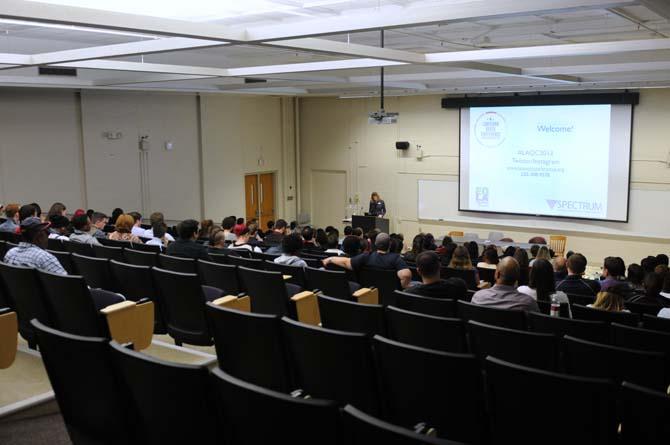Though the theme of the 2013 Louisiana Queer Conference on Saturday was “Turning Education Into Action,” keynote speaker Alison Gill encouraged attendees to view education and action as equals.
Gill, the government affairs director for The Trevor Project — the nation’s leading LGBT youth crisis and suicide prevention organization — closed out the all-day conference in Coates Hall with an hourlong keynote address that focused primarily on her experience working in youth advocacy and ended with audience questions.
Music education junior Melanie Stapleton said she agreed with Gill’s equation of education and action.
“By spreading education, we spread knowledge of the issues, and people become aware,” Stapleton said. “They empathize and help because they realize people are getting fired or committing suicide because of their identity or sexuality.”
Most of the conference’s itinerary consisted of 18 workshops in different rooms of Coates, divided into three sessions. The workshops were presented by various members of the LGBT advocate community, University students included.
Nutrition junior Markita Lewis and psychology senior Ritu Roy hosted “Being an Ally: A Process, Not A Choice,” a workshop that focused on how members of the non-LGBT community can effectively advocate for LGBT rights while remaining aware of cultural differences and privileges.
Privilege was also a topic of debate at the State of the Movement Panel, which brought activists from across Louisiana together to discuss issues currently facing the LGBT community’s push for equality and social justice.
Discussion arose after an audience member asked panelists their thoughts on encouraging minorities and allies to work with the LGBT advocacy community without resorting to tokenism. Equality Louisiana President and panel member Tim West said society must become “colorblind” when working with people, which prompted some audience members to protest.
Kameron Kilchrist, panel member, president of the University’s Spectrum organization and biological engineering senior, said it must be acknowledged that everyone has a racial identity that defines who they are while also recognizing that it should not affect their inclusion and equality.
Shreveport Political Director of People Acting for Change and Equality and panelist Adrienne Critcher said racism is Louisiana’s No. 1 problem and that the community must educate non-minorities who may “miss the mark” at times despite having good intentions.
Spanish senior Lauren Miller said although she was a little on-edge at some points of the panel, the discussion showed that diversity and minority inclusion are some of the most important issues the community needs to address.
The University’s role in LGBT equality was also discussed, including the recent addition of gender identity to the school’s fairness policy.
LAQC Chair Moriah Graham announced at the conference’s closing that attendance had increased from 175 to 208 from last year. Miller said she noticed more diversity in this year’s conference, noting the rise in older attendees and local LGBT community members.
Library science graduate student Nicholas Skaggs said the conference encouraged him to become more involved with Spectrum.
“It’s something I didn’t really do much of whenever I was an undergrad, and now I see Spectrum’s doing some really great stuff,” Skaggs said.
The conference also attracted students from other universities across the country, including Shannon Redmayne from the University of South Alabama’s Spectrum organization.
“I thought this would be a great opportunity to get ideas from other students in other parts of the region,” Redmayne said, adding that she enjoyed the informative nature of the panel and thought the conference was well-organized.
“By spreading education we spread knowledge of the issues, and people become aware. They empathize and help because they realize people are getting fired or committing suicide because of their identity or sexuality.”









